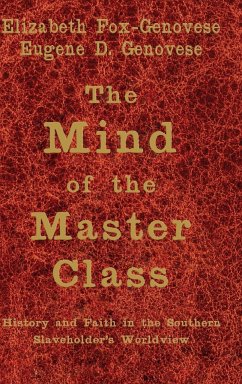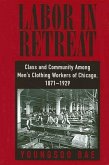The Mind of the Master Class tells of America's greatest historical tragedy.
The Mind of the Master Class tells of America's greatest historical tragedy. It presents the slaveholders as men and women, a great many of whom were intelligent, honorable, and pious. It asks how people who were admirable in so many ways could have presided over a social system that proved itself an enormity and inflicted horrors on their slaves. The South had formidable proslavery intellectuals who participated fully in transatlantic debates and boldly challenged an ascendant capitalist ('free-labor') society. Blending classical and Christian traditions, they forged a moral and political philosophy designed to sustain conservative principles in history, political economy, social theory, and theology, while translating them into political action. Even those who judge their way of life most harshly have much to learn from their probing moral and political reflections on their times - and ours - beginning with the virtues and failings of their own society and culture.
Table of content:
Part I. Cradled in the Storms of Revolution: 1. 'That Terrible Tragedy'; 2. The age of revolution through slaveholding eyes; 3. 'The Purest Sons of Freedom'; Entr'Acte: the bonds of slavery; Part II. The Inescapable Past: 4. History as moral and political instruction; 5. The slaveholders' quest for a history of the common people; 6. World history and the politics of slavery; 7. History as the story of freedom; Part III. Ancient Legacies, Medieval Sensibility, Modern Men: 8. In the shadow of antiquity; 9. Coming to terms with the Middle Ages; 10. The chivalry; 11. Chivalric slave masters; 12. Chivalric politics: Southern ladies take their stand; Part IV. A Christian People Defend the Faith: 13. A Christian people; 14. Unity and diversity among the faithful; 15. War over the Good Book; 16. Slavery: proceeding from the Lord; 17. The Holy Spirit in the word of God; 18. Jerusalem and Athens - against Paris; 19. Serpent in the garden: liberal theology in the South; 20. Theopolitics: golden rule, higher law, and slavery; Coda: St. John of Pottawatamie; Part V. At the Rubicon: 21. Between individualism and corporatism: from the reformation to the war for Southern Independence; 22. Past and future Caesars; Epilogue: King Solomon's dilemma.
The Mind of the Master Class tells of America's greatest historical tragedy. It presents the slaveholders as men and women, a great many of whom were intelligent, honorable, and pious. It asks how people who were admirable in so many ways could have presided over a social system that proved itself an enormity and inflicted horrors on their slaves. The South had formidable proslavery intellectuals who participated fully in transatlantic debates and boldly challenged an ascendant capitalist ('free-labor') society. Blending classical and Christian traditions, they forged a moral and political philosophy designed to sustain conservative principles in history, political economy, social theory, and theology, while translating them into political action. Even those who judge their way of life most harshly have much to learn from their probing moral and political reflections on their times - and ours - beginning with the virtues and failings of their own society and culture.
Table of content:
Part I. Cradled in the Storms of Revolution: 1. 'That Terrible Tragedy'; 2. The age of revolution through slaveholding eyes; 3. 'The Purest Sons of Freedom'; Entr'Acte: the bonds of slavery; Part II. The Inescapable Past: 4. History as moral and political instruction; 5. The slaveholders' quest for a history of the common people; 6. World history and the politics of slavery; 7. History as the story of freedom; Part III. Ancient Legacies, Medieval Sensibility, Modern Men: 8. In the shadow of antiquity; 9. Coming to terms with the Middle Ages; 10. The chivalry; 11. Chivalric slave masters; 12. Chivalric politics: Southern ladies take their stand; Part IV. A Christian People Defend the Faith: 13. A Christian people; 14. Unity and diversity among the faithful; 15. War over the Good Book; 16. Slavery: proceeding from the Lord; 17. The Holy Spirit in the word of God; 18. Jerusalem and Athens - against Paris; 19. Serpent in the garden: liberal theology in the South; 20. Theopolitics: golden rule, higher law, and slavery; Coda: St. John of Pottawatamie; Part V. At the Rubicon: 21. Between individualism and corporatism: from the reformation to the war for Southern Independence; 22. Past and future Caesars; Epilogue: King Solomon's dilemma.








